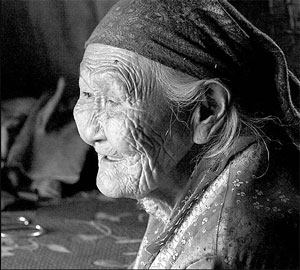|

|
| Ewenki tribesman A Rongbu welcomes the dramatic changes that progress has brought, but continues to live the traditional way. |
Nobody knows the age of Suo Maliya, female leader of an
Ewenki ethnic minority tribe that lives deep in the forests of Greater Hinggan Mountains, Inner Mongolia autonomous region, though she appears to be in her 80s.
She lives much like her ancestors have done for hundreds of years. She has more than 300 reindeers worth about 5,000 yuan ($735) apiece, which makes her worth about 1.5 million yuan ($219,000), the richest and most authoritative member of her society.
About 300 km away from the tribe's mountaintop settlement, a well-furnished village was built five years ago for Suo's tribe members. About 231 Ewenki people have started a new life here.
Suo, however, intends to stay with five or so hunters on her remote mountaintop, where all her ancestors were buried, until she too dies.
|

|
| Tribal leader Suo Maliya is determined to live - and die - on the remote mountaintop. Photos by Yang Shuhai |
When Suo passes away it could be the end of an era and a traditional way of life for the Aolu Guya Ewenki tribe. Aolu Guya is the name of the place where Suo's tribe settled and means "flourishing poplar forest".
The tribe migrated from the Lena River Valley in Russia 300 years ago and settled down in China.
Since Ewenki tribes people elsewhere had already given up their nomadic lifestyle, the Aolu Guya Ewenki were referred to as "China's last hunting tribe".
The group that settled in houses five years ago have adapted remarkably quickly to modern life.
Each household has 50 sq m of space and has basic furniture, cable television, a toilet, water, telephone and central heating, which are all supplied by the government. Flowers and vegetation are planted in some courtyards.
Members of the tribe sit in cane chairs in the shade with eyes closed, cozy and warm. Nursing homes, school and shops are also provided.
Suo Ronghua was the pioneer trader of antler products in the new village, but there are more than 10 other shops doing the same now.
The 32-year-old woman is living in a temporary shelter after the local government started an improvement project of the villagers' housing.
"Our house will be transformed into a two-story 'villa'," Suo Ronghua says with a big smile. Like others in the village she uses the Internet to send sample photos and negotiate with clients around the country.
Though some of the tribes people have left their remote mountain home, they still want to retain their tradition of letting their reindeer roam and graze.
The local government has set up five hunting spots in the forest with feed provided. There is also plentiful lichen, the favored food of reindeer. Villagers raising reindeer can use these areas in turn.
Yi Lie, 29, is one of the few youngsters left who is happy taking care of his reindeer in the forest.
His younger brother by 4 years, Yi Su, has a different take on life, however, and is about to become a cleaner. For Yi Su, his brother's life is rather colorless.
"I'm not interested in those things that Yi Lie does. I've heard enough from my grandfather about those forest stories," he says.
"I have no idea about what Yi Su is talking about, the Internet, Jay Chou, Jackie Chan, none of that is my business," Yi Lie responds.
Most youngsters born in the 1980s would rather stay in the cozy village and their villas, rather than go back to their former primitive houses in the forest.
"Why should we go back to starving and a poor life?" Yi Su asks.
The incomes of the villagers have risen over the past five years and as a result attitudes have changed.
"The younger generation lives a modern life. There's no need to be cold and worry about medical treatment. It's really dramatic progress to us," says an old hunter A Rongbu.
Even so, some people are worried the tribe's culture will be lost soon. "The essence of preserving culture is daily life. If this core is lost, (the tribe's) culture can only be found in printed words and in history displayed at a museum," says Nuo Min, a Daur minority musician.
In contrast, tribes person Zhang Li now works in the tourism business after graduating from university. "We really have a quite small population. Nobody can guarantee that our race will survive even when we chose to live in the forest," she says.
"Modern culture is helpful, our traditional reindeer grazing methods cannot be improved without modern techniques.
"We should keep up with the pace of the times. Some traditional things might go missing but we will strive to hold on to distinguished aspects of our culture."
(China Daily February 5, 2009)